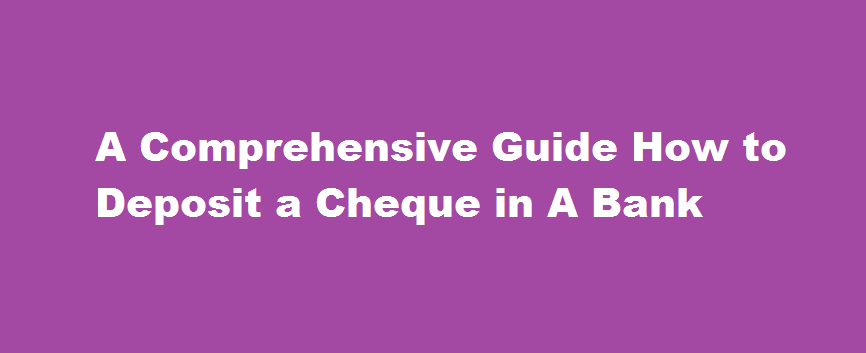A Comprehensive Guide How to Deposit a Cheque in A Bank
4 min read
Introduction
In an era dominated by digital transactions, cheque usage may seem outdated, but they still play a significant role in financial transactions. Depositing a cheque at a bank may appear daunting to some, but with the right knowledge, it can be a straightforward process. This article aims to provide a comprehensive guide on how to deposit a cheque in a bank, ensuring a hassle-free experience.
Understanding the Basics
Before diving into the process, it is important to familiarise yourself with some basic terms related to cheque depositing. A cheque is a negotiable instrument, a written order instructing the bank to pay a specified amount to the person or entity named on the cheque. The person depositing the cheque is known as the payee, while the bank where the cheque is being deposited is the depository bank. With this foundation in mind, let’s delve into the step-by-step process of depositing a cheque.
Endorsing the Cheque
Upon receiving a cheque, the first step is to endorse it. Turn the cheque over and sign on the back, following the instructions mentioned on the cheque. Some cheques require a simple endorsement, where you sign your name, while others may necessitate a restrictive endorsement, which adds specific instructions. If the cheque is being deposited jointly, all parties must sign the back. Remember to endorse the cheque with a pen and avoid using pencils or markers, as these may fade or smudge, rendering the cheque invalid.
Filling out a Deposit Slip
Next, complete a deposit slip, which is a form provided by the bank. It includes fields to enter your account number, name, date, and the amount you are depositing. Ensure accuracy when entering these details to avoid any errors or delays. If you don’t have a deposit slip, they are usually available near the bank’s teller counters or at self-service kiosks. Alternatively, you can ask a bank representative for assistance in filling out the deposit slip.
Visit the Bank
Take the endorsed cheque and the completed deposit slip to the bank. You can choose to visit the bank branch in person or utilise any mobile or online banking services offered by your bank. If you opt for an in-person visit, head to the teller counter and wait for your turn. If you are using mobile or online banking, log in to your account and navigate to the “Deposit” or “Check Deposit” option. Follow the instructions provided on the screen to complete the process digitally.
Present the Cheque
When it’s your turn at the teller counter, hand over the cheque and deposit slip to the bank representative. If you are depositing the cheque through mobile or online banking, use the designated option to upload images of the front and back of the cheque. Ensure the images are clear and legible. Review the details entered, such as the account number and deposit amount, to ensure accuracy before finalising the deposit.
Retain the Cheque and Receipt
After completing the deposit, the bank representative will return the cheque to you, usually with a receipt or a transaction confirmation. Keep the cheque in a safe place for your records. The receipt or confirmation will serve as proof of your deposit. If you deposited the cheque digitally, save the confirmation or take a screenshot for your reference.
FREQUENTLY ASKED QUESTIONS
What are the details I need to provide on the cheque to deposit?
You will need to provide your full name as per Bank’s records, your bank account number and your contact number at the back of the cheque before depositing it at our Quick Cheque Facilities. Ensure that your full name, date, amount in words and figure (which tally) and issuer’s signature are completed on the front of the cheque.
Conclusion
Depositing a cheque in a bank may seem like a complex task, but by following these step-by-step instructions, you can navigate the process with ease. Remember to endorse the cheque, fill out a deposit slip accurately, and present the cheque to a bank representative or use mobile/online banking options. Retain the cheque and transaction confirmation as proof of the deposit. By understanding these steps, you can confidently deposit cheques and make the most of traditional banking methods in the modern era of finance.
Read Also : Building Your Creditworthiness A Comprehensive Guide to Building A Strong CIBIL Score






